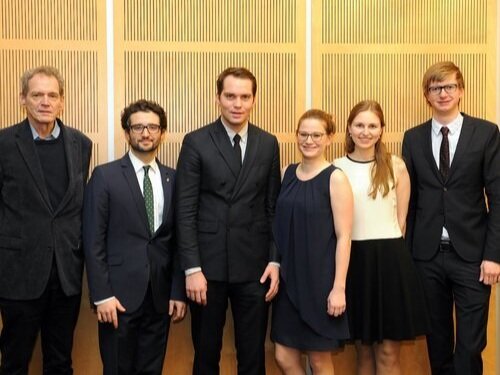Obermayer German Jewish History Award
Cordula Kappner
Hassfurt, Bavaria
Cordula Kappner will not be intimidated by anyone, anywhere. She speaks up, whatever the consequences. “I am no angel of peace,” explains the lively 62-year-old champion of ethnic minorities. “I don’t want to spread false harmony.” Although she is a gentile, her philosophy has led to anonymous anti-Jewish mail. She once found a Star of David scratched onto her car; another time, one was sprayed on the walls of her house, with a message telling her, as cryptically as menacingly, “Remember this!”
“‘She is too Jewish-friendly,’ people say—never directly, but in a small town you get to know something like that,” says Irmtraut Neubert, a teacher and a friend of Kappner.
A former director of the Hassfurt county library and the daughter of a Protestant preacher, Kappner has spent the past 20 years researching the German-Jewish history of the Franconian town and the region. She has presented the results— including material about all the Jewish families with roots there—in multiple exhibitions, written books and articles for local papers and made guided tours. With the help of school classes and interested residents, she documented seven Jewish cemeteries, and she reestablished contact with many survivors. “It made me connect to, and appreciate, my heritage and intimately get to know my grandfather—whom I never met—and my other relatives,” Doron Zeilenberger, who now lives in the United States, says about Kappner’s work.
Although her exhibitions found much interest in general, they produced opposition. But Kappner has never been one to float with the current. Even today, to avoid anyone prescribing what she should do, she pays all her own expenses, including for annual research visits to Israel since 1983. “Independence is the most important thing for me,” she explains. While at high school in Dresden in the late 1950s, she ventured to criticize the Communist collectivization of agriculture and was nearly kicked out for it. Later, after moving to Geesthacht in West Germany, Kappner—who and history teacher—built up a system of private lessons for Turkish immigrant children. “She always stood up for those who are not accepted in society; that’s a thread in her life,” says Doerte Eggers, who knew Kappner there.
In the early 1980s, then living in Hassfurt, she began doing research in archives and tried contacting survivors worldwide. Her camera always with her, Kappner drove around the region’s villages and interviewed residents, managing to loosen tongues with her disarmingly straightforward manner. “If I saw old people, I just sat beside them,” she remembers. “We would get into conversation, and I asked what they remembered and whether they had old photographs.”
In this way, Kappner collected material for her first exhibit, in 1983, which depicted deportations from Lower Franconia using a particular family from the region as an example. She concentrated at first on the persecution of Jews and the Holocaust and later broadened it to the 19th century, mounting exhibits in the Hassfurt county library, in schools and in nearby villages. “I want to reach the ordinary people in the villages,” she explains. “I want them to know what happened and what value was lost.” She published her results in an anthology.
Kappner took special care to reach young people with her work. In front of the library, she initiated a memorial for the region’s Holocaust victims. Pupils from the local high school painted the names onto bricks, and students at a vocational school built the wall.
Today she has a folder for each of the 250 Jewish families that had once lived in and around Hassfurt, including photographs, interviews with contemporary witnesses, documents and articles. And Kappner has taken a separate exhibit—34 in all—to each village in the region that once had a Jewish population. Although she retired from the library in January, she has not thought about stopping. “I would like best to start over again,” she says. “It’s so interesting, and one forgets some details.”
THIS WALL BRINGS PEOPLE TOGETHER
Students at this Berlin elementary school, built on the site of a synagogue, have been building a wall for the past two decades. It delivers a powerful message about community.
STUDENTS REACHING STUDENTS
When a handful of ninth graders from Berlin met Rolf Joseph in 2003, they were inspired by his harrowing tales of surviving the Holocaust. So inspired that they wrote a popular book about his life. Today the Joseph Group helps students educate each other on Jewish history.
“I SPEAK FOR THOSE WHO CANNOT SPEAK”
Margot Friedländer’s autobiography details her struggles as a Jew hiding in Berlin during World War II. Now 96, she speaks powerfully about the events that shaped her life and their relevance today.



